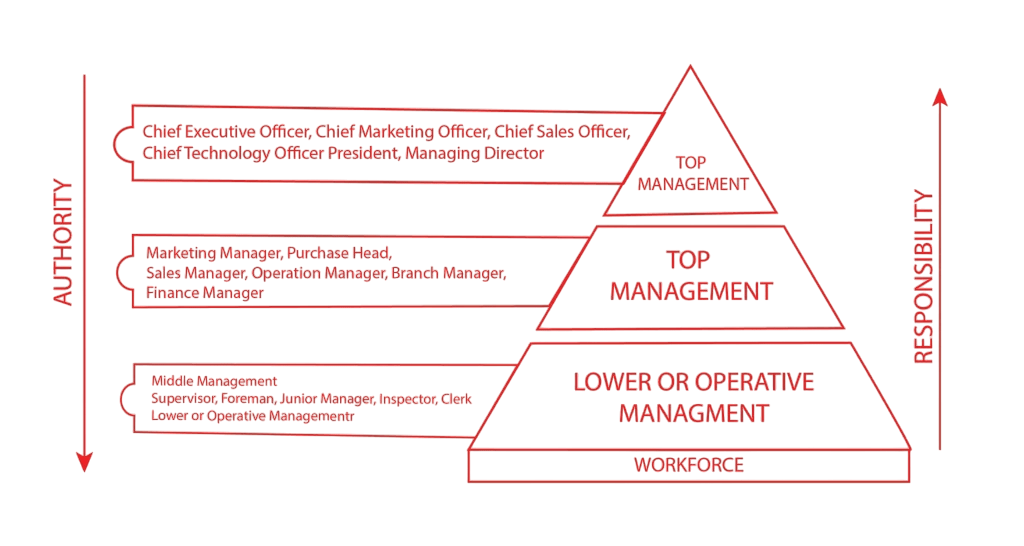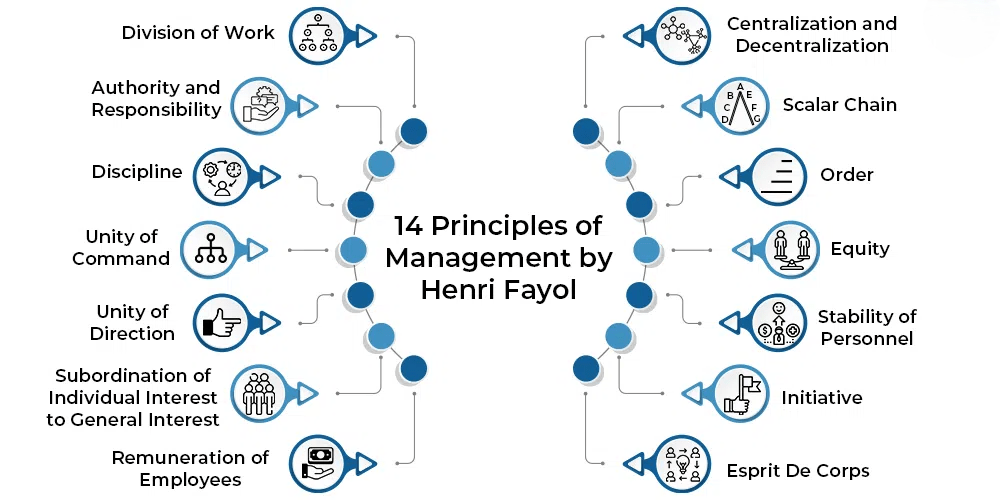
- Introduction
- Definition
- Functions of Management
- Levels of Management
- Skills Required
- Roles in Organizations
- Management vs Administration
- Scientific Management
- Principles of Management
- Contemporary Issues
- Management Tools and Techniques
- Conclusion
Introduction
What is Management is the cornerstone of every organized effort. Effective management determines how well an organization uses its resources to achieve its goals, whether it’s a multinational corporation, a government agency, or a small local business. It involves planning, organizing, leading, and controlling human, financial, and informational resources to achieve specific outcomes efficiently and effectively. As organizations grow and diversify, management complexity increases. Today’s managers are expected to navigate fast-changing markets, lead diverse teams, integrate technology, and deliver results with agility. Therefore, understanding the core concepts of Levels of Management in Business is essential for students, professionals, and aspiring leaders alike.
To Explore PMP in Depth, Check Out Our Comprehensive PMP Certification Training To Gain Insights From Our Experts!
Definition
Management in simple words can be defined as the process of planning, organizing, directing, and controlling resources, including people, processes, and assets, to achieve organizational objectives efficiently and effectively.
Prominent definitions include:
- Henri Fayol: “To manage is to forecast and plan, to organize, to command, to coordinate, and to control.”
- Peter Drucker: “Management is doing things right; leadership is doing the right things.”
In essence, management is both a science and an art it requires technical knowledge and interpersonal skills to guide teams and operations toward success.
Functions of Management
The functions of management are universal across industries and organizational sizes. These core functions form the basis of most managerial activities and are traditionally divided into five categories:- Plan: Planning involves determining the organization’s goals and devising strategies to achieve them. It involves setting objectives, analyzing trends, forecasting, and resource allocation./
- Organizing: Structuring resources and tasks to implement the plan. This includes creating departments, delegating authority, and defining job roles.
- Staffing involves recruiting, training, and developing employees. It ensures that the organization has the right people in the right positions.
- Directing (Leading): Motivating and leading employees to achieve goals. It includes communication, supervision, and leadership.
- Controlling involves monitoring and evaluating performance against goals. It includes setting performance standards, measuring actual performance, and taking corrective actions.
Management process in organization functions are dynamic and interdependent. Good management ensures they are performed in a coordinated manner for optimal outcomes.
Are You Interested in Learning More About PMP? Sign Up For Our PMP Certification Training Today!
Levels of Management
Levels of Management in Business occurs at different organizational levels, each with unique responsibilities and perspectives.Top-Level Management
- Includes positions like CEO, CFO, and Managing Director.
- Responsible for strategic decisions, policy formulation, and long-term planning.
- Focus on vision, mission, and organizational growth.
Middle-Level Management
- Includes department heads, regional managers, and division supervisors.
- Bridge the gap between top and operational levels.
- Translate top-level strategies into departmental plans and oversee implementation.

Lower-Level (Operational) Management
- Includes supervisors, team leaders, and foremen.
- Focus on day-to-day operations, task assignments, and employee supervision.
- Ensure productivity and quality at the ground level.
Each level is crucial, and coordination is vital for organizational success.
Are You Preparing for PMP Jobs? Check Out ACTE’s Project Management Interview Questions & Answer to Boost Your Preparation!
Skills Required
Effective managers must possess technical, human, and conceptual skills.
Key Managerial Skills:
- Technical Skills: Knowledge of the specific field’s tools, techniques, and processes.
- Human Skills: Working with, motivating, and leading people. Essential for team building and conflict resolution.
- Conceptual Skills: Ability to think abstractly, understand complexities, and solve strategic problems.
- Decision-Making Skills: Analyzing information, evaluating alternatives, and making sound judgments.
- Communication Skills: Clear articulation of ideas and active listening to stakeholders.
- Time Management: Prioritizing tasks and managing time effectively to meet deadlines.
The balance of these skills varies by level for instance, technical skills are more critical at lower levels, while conceptual skills dominate at the top level.
Roles in Organizations
Managers perform multiple roles depending on their level and department. Henry Mintzberg, a renowned management theorist, classified managerial roles into three main categories:
Interpersonal Roles
- Figurehead: Performing ceremonial duties.
- Leader: Motivating and developing staff.
- Liaison: Building networks within and outside the organization.
Informational Roles
- Monitor: Gathering and analyzing information.
- Disseminator: Sharing information with teams.
- Spokesperson: Representing the organization externally.
Decisional Roles
- Entrepreneur: Initiating change and innovation.
- Disturbance Handler: Managing conflicts and crises.
- Resource Allocator: Distributing resources effectively.
- Negotiator: Representing the organization in negotiations.
Management vs Administration
| Aspect | Management | Administration |
|---|---|---|
| Scope | Focuses on implementing policies | Focuses on setting policies and goals |
| Nature | Executive and operational | Strategic and planning |
| Decision-Making | Tactical and routine decisions | Policy-related and strategic decisions |
| Authority Level | Middle and lower levels | Top-level |
| Flexibility | More dynamic and adaptable | More stable and procedural |
Management is more prevalent in business, while administration is often seen in government and public sectors.
Are You Considering Pursuing a Master’s Degree in PMP? Enroll in the PMP Masters Program Training Course Today!
Scientific Management
Frederick Winslow Taylor’s scientific management process in organization brought a major change to how work was organized in the early 20th century. His approach aimed to improve efficiency through systematic techniques in work processes. The key ideas of scientific management include performing a scientific job analysis, where tasks are divided into smaller parts and standardized to find the best way to complete them. It stresses the importance of selecting and training employees based on their skills for specific roles and providing them with the right guidance. Time and motion studies are used to track and remove unnecessary movements, which increases productivity. Taylor also pushed for teamwork between managers and workers instead of encouraging individualism to make operations run more smoothly. Another important aspect was the division of labor: managers focused on planning and supervision while workers carried out the tasks. Although this management in simple words method has faced criticism for being too rigid and mechanical, scientific management laid the groundwork for modern operations management and practices in industrial engineering.
Principles of Management
Henri Fayol, an important contributor to modern management theory, established 14 management principles that still impact organizational practices today. These principles provide a foundational framework for effective management in simple words and organizational setup. The principle of work division highlights that specialization enhances efficiency and productivity. Authority must be accompanied by responsibility, ensuring that leaders are accountable for their actions. Discipline is vital for maintaining order and facilitating smooth operations. The unity of command principle states that employees should receive guidance from only one supervisor to prevent confusion, while the unity of direction principle ensures that all efforts are coordinated under a single plan and leader for each goal.

Fayol also emphasized that the interests of the organization should take precedence over personal interests, and that equitable compensation is crucial for motivating staff. Centralization should be adjusted based on the organization’s requirements, and the scalar chain illustrates a clear hierarchy that outlines the lines of authority. The order principle underscores the importance of positioning people and resources where they can function most effectively, and equity endorses fairness and respect throughout the organization. Promoting stability in tenure contributes to loyalty and efficiency, while nurturing initiative encourages creativity and problem-solving. Finally, fostering esprit de corps, or team spirit, enhances unity and collaboration among the workforce. These principles remain essential guidelines for organizing structures and directing managerial conduct in both traditional and contemporary workplaces.
Contemporary Issues
Modern managers face challenges that require adaptability, innovation, and continuous learning.
Key Contemporary Issues:
- Globalization: Managing international teams, cross-cultural communication, and global competition.
- Technology Integration: Leveraging AI, automation, and digital tools for operational efficiency.
- Workforce Diversity: Ensuring inclusivity, equity, and diversity in the workplace.
- Remote Work: Managing productivity and collaboration in virtual environments.
- Sustainability: Balancing profit with environmental and social responsibility.
- Ethical Management: Upholding integrity and accountability in decision-making.
- Talent Retention: Engaging and retaining skilled professionals in competitive markets.
Addressing these issues requires a strategic and human-centered approach to management.
Management Tools and Techniques
Modern management uses various tools and techniques to plan, analyze, and improve performance.
Common Tools:
- SWOT Analysis (Strengths, Weaknesses, Opportunities, Threats): Strategic planning.
- Balanced Scorecard: Measuring organizational performance across multiple areas.
- PERT and CPM: Project planning and scheduling.
- Lean Management: Eliminating waste and maximizing value.
- Six Sigma: Improving quality and reducing defects.
- KPI Dashboards: Tracking performance indicators.
- Decision Matrix: Systematic decision-making.
Using the right tools helps managers make informed decisions and achieve objectives more effectively.
Conclusion
What is Management is a critical function that drives success in every type of organization. It blends art, science, and practice to achieve efficiency, effectiveness, and adaptability in a complex management process in organization. The field of management has evolved from classical theories to modern digital tools, yet its core functions planning, organizing, leading, and controlling remain management in simple words fundamental. Effective management aligns resources with objectives, empowers people, and fosters innovation. As businesses face new challenges in a globalized, digital, and dynamic world, the need for skilled, ethical, and visionary managers has never been greater. Investing in management education, tools, and leadership development is essential for building resilient and future-ready organizations.





